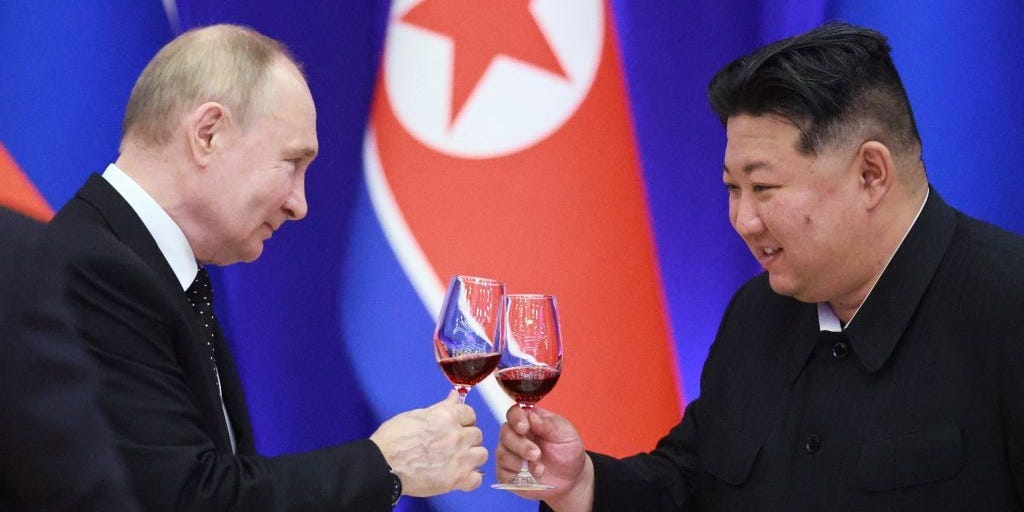Putin and Kim’s Growing Alliance: A Geopolitical Headache for the US and China
In a highly publicized summit last week, Russian President Vladimir Putin and North Korean leader Kim Jong Un signed a groundbreaking mutual defense pact. This new alignment marks the closest ties between Russia and North Korea since the Cold War, causing significant geopolitical ripples that affect not only the United States but also China.
The Summit and Defense Pact
During his first visit to North Korea in 24 years, Putin joined Kim in Pyongyang for a series of discussions that culminated in the signing of the mutual defense agreement. This pact obligates both nations to aid each other in case of an attack and follows earlier arms deals where North Korea supplied Russia with weapons to alleviate ammunition shortages in Ukraine. In return, North Korea has likely received food, petroleum products, and potentially advanced military technology for nuclear-powered submarines and intercontinental ballistic missiles.
This agreement is a notable escalation in the Russia-North Korea relationship and poses multiple challenges for the US and its allies, complicating the dynamics in the Indo-Pacific region and worsening tensions on the Korean peninsula.
Strained US Relations and the "Axis of Upheaval"
The new alliance strengthens Putin’s position in his war against Ukraine and potentially allows North Korea to bypass international sanctions, further destabilizing the region. Experts are now referring to this coalition as an "axis of upheaval," directly challenging the US-led world order.
US President Joe Biden faces the immediate task of navigating the heightened complexities brought on by this development. In response to the summit, South Korea has indicated that it may abandon its policy of not supplying lethal aid to Ukraine, adding another layer of complexity to the situation. A senior official in South Korea has hinted that Seoul could consider sending arms directly to Kyiv, which would mark a significant policy shift.
China’s Dilemmas
Interestingly, the new Russia-North Korea alliance is not just a headache for the US; it’s equally troubling for China. According to Victor Cha, Vice President for Asia and Korea Chair at the Center for Strategic and International Studies, China’s options for responding to this evolving relationship are limited.
Beijing has traditionally maintained strong influence over North Korea and has been cautious about its nuclear weapons tests and UN Security Council sanctions. However, the growing bond between Moscow and Pyongyang leaves China awkwardly sidelined, unable to publicly criticize North Korea or halt industrial support to Russia without jeopardizing its own strategic interests.
China has attempted to maintain its status as North Korea’s primary ally despite previous summits between Kim and international leaders like former US President Donald Trump and Russian President Putin. But the dynamics have now shifted. The emerging Russia-North Korea partnership threatens China’s influence and could lead to even more fragile stability on the Korean peninsula.
Regional Ramifications
The closer ties between Russia and North Korea could lead to significant advances in North Korean military capabilities, emboldening Kim Jong Un’s regime. South Korea is already on high alert, considering the potential for further escalation. If Russia continues to support North Korea militarily, it could push South Korea to reconsider its own defense strategies, including the possibility of developing its nuclear arsenal—a topic currently deterred by strong US defense commitments.
Given the tightening Russia-North Korea relationship, US-led alliances in the region, particularly with Japan and South Korea, will likely grow stronger. This will increase military exercises, demonstrations, and a robust American presence in the Indo-Pacific, actions that China has consistently opposed.
China’s Position
China’s response has been cautiously muted. Chinese Foreign Ministry spokesperson Li Jian commented only that the cooperation between Russia and North Korea is a matter between two sovereign states. However, Li’s statement does not entirely mask China’s underlying concerns about potential instability in Northeast Asia.
US Deputy Secretary of State Kurt Campbell recently suggested that China is anxious about these evolving dynamics. Beijing is likely worried that North Korea could be emboldened to take provocative actions, escalating tensions and potentially leading to a crisis.
Conclusion
The newly forged alliance between Russia and North Korea signifies an emerging geopolitical challenge with far-reaching consequences. While it clearly strains US foreign policy, it also creates significant strategic dilemmas for China. For both countries, managing this complex dynamic will require delicate balancing acts and strategic foresight. With the potential for increased military capability in North Korea and stronger US-led alliances in the region, the geopolitical landscape is set for heightened tensions and increased uncertainty.
